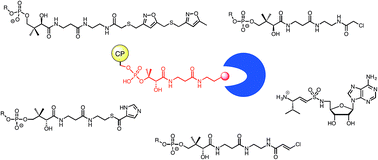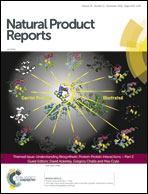Trapping interactions between catalytic domains and carrier proteins of modular biosynthetic enzymes with chemical probes
Abstract
Covering: up to early 2018
The Nonribosomal Peptide Synthetases (NRPSs) and Polyketide Synthases (PKSs) are families of modular enzymes that produce a tremendous diversity of natural products, with antibacterial, antifungal, immunosuppressive, and anticancer activities. Both enzymes utilize a fascinating modular architecture in which the synthetic intermediates are covalently attached to a peptidyl- or acyl-carrier protein that is delivered to catalytic domains for natural product elongation, modification, and termination. An investigation of the structural mechanism therefore requires trapping the often transient interactions between the carrier and catalytic domains. Many novel chemical probes have been produced to enable the structural and functional investigation of multidomain NRPS and PKS structures. This review will describe the design and implementation of the chemical tools that have proven to be useful in biochemical and biophysical studies of these natural product biosynthetic enzymes.

- This article is part of the themed collection: Understanding biosynthetic protein-protein interactions


 Please wait while we load your content...
Please wait while we load your content...